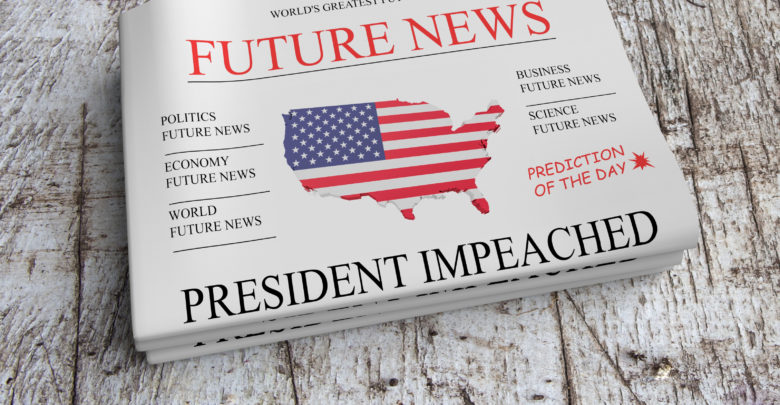Trump’s Doral Scandal: An Impeachable Offense

The tempo of Trump-related news is so great that it is easy to forget what happened last week, let alone last month or last year. But it is worth keeping track of the details of the recent Doral scandal, since it is going to play a part in a lawsuit against the president and could figure in the ongoing impeachment proceedings in the House of Representatives.
The big picture: Donald Trump’s decision to award the 2020 G-7 summit to his own private company, the Trump National Doral Miami golf resort, is not just a likely violation of the Emoluments Clause of the Constitution, although that would be bad enough.
It’s worse than that.
It’s about using executive power to circumvent not only the letter, but also the very purpose of laws and regulations designed to keep conflicts of interest and self-dealing out of the process of awarding government contracts.
The U.S. government is the largest contractor in the world. Each year, the government hands out about $500 billion—half a trillion dollars—in contracts to private suppliers of goods and services.
It doesn’t take a genius to figure out that such a juicy target, if not carefully policed, is a virtual invitation to unscrupulous government officials to line their pockets by pushing contract awards into the hands of family, friends, and corrupt associates. The government might just as well put up a sign saying, “Come and get it!”
So it’s no surprise that the government procurement process is regulated by a web of statutes and regulations designed to assure a fair process for the award of contracts, free of conflicts of interest, self-dealing and sweetheart deals.
At the center of these protections is a massive system of regulation called the Federal Acquisition Regulations (FAR). The FAR system was established in the 1980s to codify uniform procedures for procurement by all government agencies. Its purpose is “to deliver on a timely basis the best value product or service” while “maintaining the public’s trust and fulfilling public policy objectives.”
Unless you have a law degree, unlimited time, and a passion for regulatory-speak, don’t try to read this entire document. Believe me, you won’t even get up to the 21-page “Definitions” section, much less through it.
Suffice it to say that the FAR system includes elaborate safeguards to prevent conflicts of interest and self-dealing in the award of government contracts. Those safeguards are introduced with the following statement of purpose:
“Government business shall be conducted in a manner above reproach and, except as authorized by statute or regulation, with complete impartiality and with preferential treatment for none. Transactions relating to the expenditure of public funds require the highest degree of public trust and an impeccable standard of conduct. The general rule is to avoid strictly any conflict of interest or even the appearance of a conflict of interest in Government-contractor relationships. While many Federal laws and regulations place restrictions on the actions of Government personnel, their official conduct must, in addition, be such that they would have no reluctance to make a full public disclosure of their actions.”
Donald Trump’s participation in the decision to award the 2020 G-7 summit to his own property is wildly, insanely contrary to everything the FAR system was designed to accomplish. Start with this, one of the dozens of FAR-system provisions violated by Trump’s decision:
“Except as specified in 3.602, a contracting officer shall not knowingly award a contract to a Government employee or to a business concern or other organization owned or substantially owned or controlled by one or more Government employees. This policy is intended to avoid any conflict of interest that might arise between the employees’ interests and their Government duties, and to avoid the appearance of favoritism or preferential treatment by the Government toward its employees.” [Emphasis added.]
The fact that the president and his staff directed the “process,” if we can even call it that, is about the only thing we know about how this decision was made. We know that Trump was directly involved because White House chief of staff Mick Mulvaney admitted that it was Trump’s idea in the first place. And we know that some kind of “process” took place because Mulvaney said that the administration examined 10 sites before choosing Trump Doral.
What we don’t know is who else participated in the decision. Or what agency actually made it. Or anything else about the process.
Normally, the White House doesn’t directly enter into service contracts with outside suppliers. One would suspect that the decision to award contracts for a G-7 summit would fall under the purview of the State Department.
In an attempt to learn something about the process, the left-leaning watchdog group Citizens for Responsibility and Ethics in Washington (CREW) sent a letter to the Inspector General of the State Department. CREW’s letter raised questions about presidential conflicts of interest, violations of FAR and other procurement laws, and violation of the Constitution’s Emoluments Clause.
Whether the Office of the Inspector General will see fit to open an investigation remains to be seen.
But we don’t need an OIG investigation to know that Trump’s participation in awarding a lucrative government contract to himself is precisely the kind of thing that has placed “abuse of power” for personal gain at the center of America’s impeachment history. In its comprehensive 1974 report on the “Constitutional Grounds for Presidential Impeachment,” the staff of the House Judiciary Committee identified three categories of conduct that have historically led to impeachment in the United States:
“(1) exceeding the constitutional bounds of the powers of the office in derogation of the powers of another branch of government; (2) behaving in a manner grossly incompatible with the proper function and purpose of the office; and (3) employing the power of the office for an improper purpose or for personal gain.” [Emphasis added.]
The fact that the president was ultimately forced to back down from his decision to award a government contract to himself doesn’t erase the stain. He didn’t back down because he realized in hindsight that the decision was wrong. Quite to the contrary, he insisted that he had done “something very good for our country,” but changed course only because “the Hostile Media & their Democrat Partners went CRAZY!”
In other words, Trump first awarded a lucrative government contract to himself, and then reversed the decision for purely political purposes.
That’s not a defense, folks.
And then you have to ask, why was Trump involved on both sides of this contract award in the first place?
The president’s tweets about the Doral deal strongly suggest that he still has a say in running the Trump Organization. This flies in the face of repeated assurances by the Trump family that the president would be kept strictly out of the loop. As Jonathan V. Last pointed out in The Bulwark, “When Donald Trump became president he refused to divest himself of his company, the Trump Organization. Instead, he claimed that he turned over operations of the organization to his children, so that even though he could still profit from it, he would have no decision-making authority over the business. This [Doral] arrangement didn’t even pass the laugh test, let alone the smell test.”
So let’s hope that Congress doesn’t dismiss this appalling abuse of power for self-interest as just another in a long list of Trump follies.
It’s more than that.
It’s an impeachable offense.




